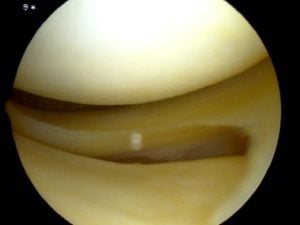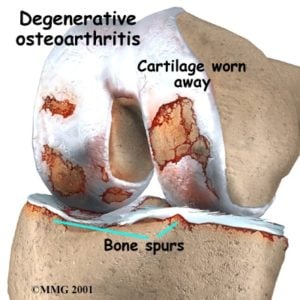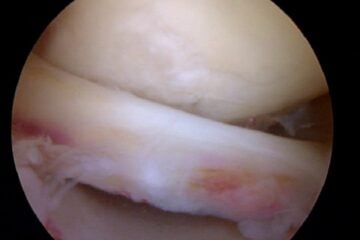

The meniscus is one of the most important structures we have within our knees. Within each of our knees we have two menisci:
- We have an inner, or medial meniscus
- and an outer, or lateral meniscus.
Again, the meniscus is a very important structure. The meniscus plays two important roles within the knee.
- A meniscus is a critical shock absorber within the knee.
- The meniscus also provides stability within the knee.
How Important is the Meniscus?
When the meniscus is torn, and thus not functioning well it will lead to more stress on the cartilage on the end the femur and the top of the tibia. This is a why a meniscus tear can lead to osteoarthritis.

Every time you step down your meniscus absorbs the majority of the weight you are putting on the leg. If the mensicus is torn, or absent then that weight will need to be distributed elsewhere — and thus set in motion a series of events which will eventually lead to osteoarthritis, or loss of cartilage and seriously diminished function and potentially significant pain.
As we recently discussed on this blog, meniscus tears occur for two main reasons. Some of you will have suffered an injury and thus have an acute meniscus tear. Others do not recall any injury, the pain simply started after you squatted down to get something from a cabinet. In that instance you have a degenerative tear where your meniscus wore out over time and gave way with minimal trauma.
The cause of your meniscus tear has a significant impact on the treatments we will recommend to you. Because a meniscus is so important to maintaining proper function of the knee, in many acute injury cases we might recommend a repair. A repair means sewing the torn pieces together. That will maintain the integrity of the meniscus — and thus minimize your risk of developing osteoarthritis.
In future posts… our Experts will comment on treatment recommendations based on the type of tear that you have.
Stay tuned … The importance of the meniscus is now clear. Let’s better define how they should be treated.














Hello Dr. Luks,
I slipped on ice and my knee hyperextended sideways. I first saw the PA of an orthopedic surgeon who manipulated it and decided I had no damage and see them back in a month. I was in severe pain and asked for an MRI , he said no , I insisted just in case there was worse damage. After my 3rd request he relented. I got the MRI and , it’s my right knee, I have a right meniscus tear and a right ACL tear. My leg has collapsed four times with great pain. I now have a hinged support. I also have a previous Achilles tendinitis on the same leg and plantar faciitis. I finally saw the Dr today and he won’t do surgery, ” as I am too heavy, 5’5″ 241lbs, ” and don’t look like I do activity anyway so waiting it might heal on its own! I am in pain , he said no your not you aren’t in pain, I have a bruise internally in my joint he said., I’m sorry this is so long I do have a question.. I have been a flight attendant for 31 years, am disabled due to another illness. He was hurried and I asked is it a complete tear ? He ignored my question took about 2 minutes to point out my MRI explanation. I also told him I was diagnosed with spondylitis,also no comment. He said my leg should not collapse by just walking, but it did, excruciating pain. He then said it may heal on its own in six months and again commented I don’t look like an active person. 2 years ago I was jogging 3 miles a day and would like to get back to normal activity. Should I change Drs or is this true what he says. I’m worried without surgery at 51 I will have future problems. I realize I have to lose weight I am doing my best. But wait and see? My pain is bad and I want to be able to be active again. I wasn’t able to ask questions, just hurried out. I’m baffled?
second opinions almost always help for clarification after you have had time to process the information. I do not know if you need surgery or not and without examining you I can not comment further on that.